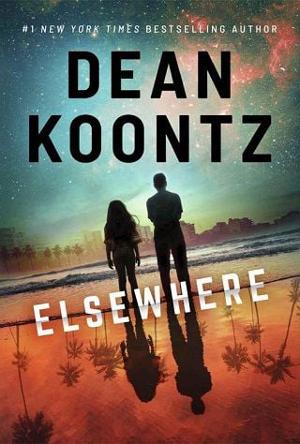41
A life could be snuffed out as suddenly as the candle flames in the amber-glass cups on the kitchen table.
Michelle blamed herself for the deaths of her husband and only child. She had lived with guilt for a long time, although over the past seven years, the acute pain of grief had settled into a less acute but more enduring sorrow.
On the day it happened, she had been obsessing on her music career, or lack of one, bemoaning that her life had, as she thought, gone far off the tracks. In truth, there were no tracks of destiny through the chaos of life, only paths forged by decisions. She had dreamed of riding a fast train to stardom, but the rails and ties of those tracks had never been carefully laid. At the time, she thought her decision to marry Jeffy and conceive Amity had derailed her, but they were not to blame. She sabotaged herself by writing songs that were, like the one Ed earlier critiqued, a "celebration of young-adult angst," cliché-ridden and jejune; indeed, the tune that he dissed was the least puerile of them.
She had started a quarrel with Jeffy, blaming her failure on him. But Jeffy, being Jeffy, would not argue, a failure to engage that further infuriated Michelle. Amity was four at the time, and Jeffy said the tension in the house was upsetting her. He wouldn't even blame Michelle for frightening the girl, as if the problem were some tension arising from an architectural error in the structure.
To give Michelle time to cool off and compose herself, he took a walk into town with Amity, to get the girl a cone of her favorite flavor at an ice cream shop. He was carrying the child in his arms, crossing a street, when a drugged and drunken driver in a speeding Cadillac Escalade struck them, knocked them down like tenpins, drove over them, and dragged the battered bodies more than two hundred feet before coming to a stop.
Now she frowned at the so-called key to everything, which lay on the table. She raised her head to stare at Ed Casper, wondering how she could have failed to suspect that he was as unbalanced as any other broken soul who tented in the wilds beyond the end of Shadow Canyon Lane.
As she held a fig by its stem, turning it around and around on her plate, she wondered at her gullibility. But in fact she knew the explanation for it. Her mother had died in childbirth. Twenty-two years later, the day after Amity's birth, Michelle's special father, Jim Jamison, had been electrocuted as he was overseeing maintenance of a power-company transformer in a subterranean vault. Ed Casper looked nothing like Michelle's father, but he was now the same age as her dad when he died. The two shared a certain spirit, a joie de vivre, and the timbre of their voices was similar; Jim Jamison, like Ed, loved music and art and history. In each man, an inherent kindness revealed itself in countless small ways. Long alone, she had needed a touchstone against which to test the mettle of her heart and mind. One day when her melancholy was at high tide, Ed stopped by the porch to listen to her play guitar, and in need of a friend who was also a mentor, she'd set aside all doubts about him.
Until now.
It was crazy but also cruel to claim that the dead could be brought back to life by some gadget that resembled a cell phone.
He read her expression and her eyes correctly, and before she could express her dismay, he withdrew a paperback book from an inner pocket of his sport coat. He displayed the cover—Infinite Worlds: Parallel Universes and Quantum Reality by Dr. Edwin Harkenbach. He turned the book over and tapped a small photograph on the back of it. Although the author in the photo was younger than Ed Casper, with a mustache and beard, they were undeniably the same person.
"As Edwin Harkenbach, I was a famous physicist and prolific author. As Ed Casper, I am the quirky old duck who lives up the canyon, in a tent, just another homeless guy, though cleaner than many and never without a tie."
Michelle still felt betrayed. "Anyone can self-publish a book these days."
Sliding the volume across the table to her, he said, "It's not from a vanity press. Look at the publisher's name. One of the oldest and most respected for nonfiction."
The publisher was indeed of high caliber. However, the book alone didn't confirm the validity of his claim to be able to undo tragedies, nor did it certify his sanity, although it gave him a measure of credibility.
"But why would you lie to me about your name?"
"Not just to you, dear. These days, I lie to everyone about my name. After destroying all records of his revolutionary work, which the government had generously funded, and after setting his lab on fire, Edwin Harkenbach crashed his twin-engine Cessna into the sea during a desperate attempt to escape to a Caribbean sanctuary before authorities discovered what he had done. His body was never found, nor will it ever be, I hope."
 Fullepub
Fullepub 



